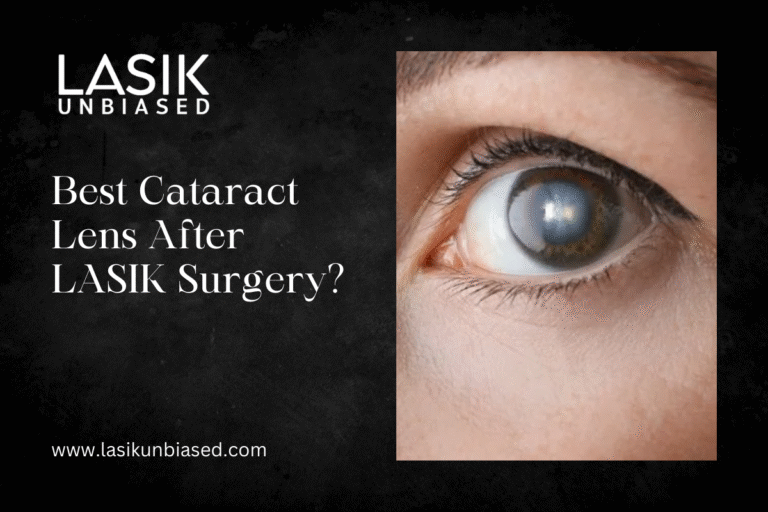The best cataract lens after LASIK surgery depends on individual eye characteristics and lifestyle demands.
Consulting your eye surgeon and understanding your options is essential for choosing the most suitable lens.
Having undergone LASIK for vision correction, your eye’s corneal shape differs from that of patients who haven’t had the procedure. This unique factor shapes how your surgeon will approach selecting the ideal intraocular lens (IOL) to restore your vision after cataract surgery. Below, we explore the different types of advanced cataract lenses and what you need to know to make an informed decision.
How LASIK Impacts Cataract Surgery?
Why LASIK History Matters for Lens Selection?
LASIK alters the cornea by reshaping it to correct refractive errors such as myopia or hyperopia. While this improves vision, it can also impact the accuracy of achieving the desired outcome with cataract lens implants. The corneal curvature changes can make it challenging for surgeons to calculate the power of the lens replacement, requiring specialised methods or prior eye data.
Patients with a history of LASIK may experience issues like glare and halos due to corneal irregularities. Therefore, selecting IOLs that neutralise aberrations and correct astigmatism or presbyopia is crucial to achieving optimal visual outcomes.
The Role of Pre-LASIK Data
Pre-LASIK eye measurements, such as keratometry and refractive data, are invaluable during cataract surgery. If this data isn’t accessible, surgeons may have to rely on advanced technologies such as optical coherence tomography (OCT) or intraoperative aberrometry for precise lens calculations.
Key takeaway: Inform your surgeon about your LASIK history and enquire if pre-LASIK records will be factored into your lens selection.
Top Cataract Lenses for Post-LASIK Patients
The appropriate cataract IOLs vary based on visual preferences and the specific corneal changes induced by LASIK. Below are the most recommended lens types for individuals with a LASIK background:
1. Monofocal Lenses
Monofocal lenses are the most basic type of IOL and offer excellent clarity, but they focus only on one distance. You’ll need to choose between near, intermediate, or distance vision correction, and may need glasses for other ranges.
Why do they work for LASIK patients?
- Accurate for single-distance tasks like reading or driving.
- Lower cost compared to premium lenses.
- Minimal risk of glare or halos, making them suitable for patients with existing issues post-LASIK.
This is a dependable option for those who prefer simplicity or do not mind relying on glasses for specific activities.
2. Multifocal Lenses
Multifocal IOLs provide vision correction across multiple ranges (near, far, and intermediate). These lenses reduce or eliminate the need for glasses for most tasks.
Is it ideal for LASIK patients?
Multifocal lenses can sometimes lead to glare and halos, which are existing concerns for many post-LASIK patients. However, technological advancements have improved their suitability, particularly if targeted customisation is applied.
If versatility is your priority, multifocal lenses can offer unparalleled convenience by addressing various visual ranges simultaneously.
3. Extended Depth of Focus (EDOF) Lenses
EDOF lenses represent a significant advancement in cataract lens technology. Unlike multifocal lenses, EDOF lenses provide a single elongated focal point, enhancing depth of focus and reducing visual side effects like glare and halos. However, while they offer excellent intermediate and distance vision, their near-vision capabilities may be limited, often providing only moderate performance.
Why choose EDOF lenses after LASIK?
- Excellent for intermediate and distance vision.
- Reduced risk of halos compared to multifocal counterparts.
- Effective for modern tasks such as computer work and watching TV.
These are highly popular among LASIK patients seeking balance and fewer side effects from lens implantation.
4. Toric Lenses
For individuals with significant astigmatism following LASIK, toric IOLs may be an excellent solution. These specialised lenses are designed to correct both astigmatism and common vision impairments. However, their effectiveness depends on the nature of your astigmatism. Toric lenses work best for regular, measurable astigmatism, but corneal irregularities resulting from LASIK can sometimes limit their suitability.
How do toric lenses benefit post-LASIK corneas?
By addressing astigmatism, toric lenses help provide sharper overall vision. Precise positioning during surgery ensures maximum effectiveness.
5. Customised Lenses (Light-Adjustable Lenses)
Light-adjustable lenses (LALs) are highly customisable options that allow post-surgery adjustments using ultraviolet light to fine-tune refractive power. This feature is particularly beneficial for post-LASIK patients, as it enables precise vision refinement after surgery, accommodating the unique corneal alterations resulting from LASIK.
Key benefits for LASIK patients:
- Higher precision due to post-operative adjustments.
- Eliminates reliance on pre-LASIK data accuracy.
- Provides a tailored result suited specifically to individual needs.
Note: LALs are premium lenses and may not be covered by insurance.
Factors to Consider When Choosing a Cataract Lens After LASIK
Selecting the best lens option for your eyes goes beyond technical specifications. Here are the aspects to review:
Vision Goals
Are you looking for glasses-free independence or do you prioritise clarity at a specific range? Understanding your vision goals will significantly impact your decision-making.
Lifestyle Considerations
Think about your daily routine. Do you spend more time reading, working at a computer, or enjoying outdoor activities? For example:
- Multifocal or EDOF lenses suit active lifestyles that require diverse vision ranges.
- Monofocal lenses may be sufficient for simpler routines.
Potential Visual Disturbances
LASIK and glare sensitivity:
Post-LASIK sensitivity to light and glare is a common issue. If you’ve struggled with visual disturbances in low light, avoid lens types that may exacerbate these problems.
Budget and Insurance Coverage
Certain advanced IOLs, like multifocal or LALs, may not be fully covered by insurance plans. Discuss pricing and payment options with your surgeon to understand your commitment upfront.
The Importance of an Experienced Eye Surgeon
Navigating your lens options alone can be overwhelming. An experienced ophthalmologist is pivotal in ensuring the success of cataract surgery for LASIK patients. They will:
- Use advanced diagnostic tools to calculate the best lens power.
- Discuss the pros and cons transparently based on your unique case.
- Tailor the procedure to fit your refractive history and vision goals.
Closing Thoughts on the Best Cataract Lenses for LASIK Patients
If you’ve had LASIK, your eyes have unique needs when it comes to cataract surgery. The right lens can restore clarity while ensuring a smooth transition, allowing you to relive the freedom that LASIK once brought.
Key Takeaway: Whether you choose monofocal lenses, EDOF IOLs, or customised options, always prioritise open communication with your ophthalmologist. Their expertise, combined with the latest in eye-care technology, ensures your vision after cataract surgery is as sharp and dependable as possible.
Looking for more personalised advice? Schedule an appointment with an ophthalmology expert to explore options tailored uniquely to you.


